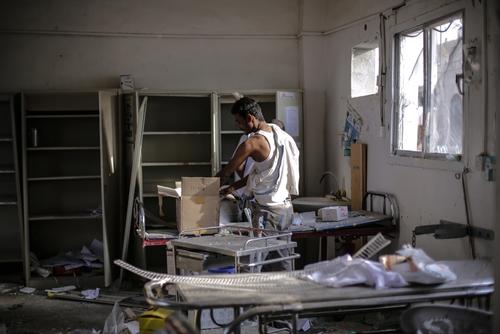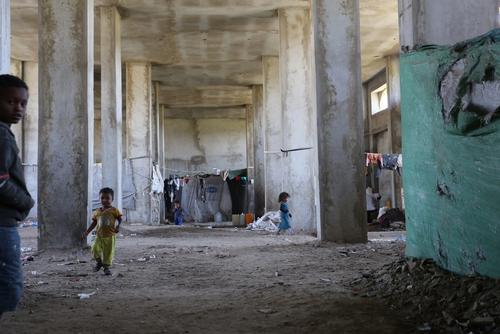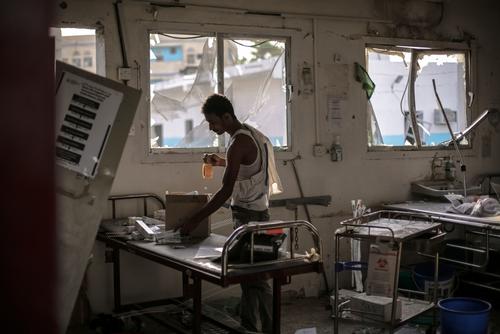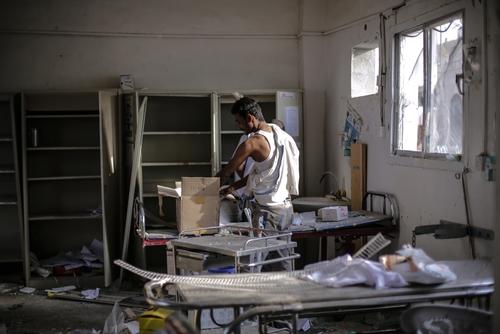A full-scale war has been raging in Yemen since March 2015 at immense cost to the population. All warring parties, including the Saudi-led coalition and the Houthis, have carried out indiscriminate attacks on civilians and civilian infrastructure such as hospitals, schools and markets. Hundreds of health facilities across the country have stopped functioning either due to attacks or lack of supplies or staff, crippling people's access to healthcare. The rising cost of living, particularly of food and fuel, makes it very hard for families to meet basic needs. There is an urgent need for the warring parties to reduce the disproportionate impact this war is having on civilians, and for humanitarian actors to scale up assistance for the population.
MSF teams are treating patients for violence-related injuries and are managing mass casualty influxes across most of our projects. In total, over 55,000 war-wounded and victims of violence were treated by MSF teams between March 2015 and the end of November 2016. In Taiz city in October 2016 nearly 500 patients with violence-related injuries were treated in MSF and MSF-supported health structures, of these 23 per cent were women and children.
Health problems already present in Yemen prior to the war, such as low maternal health coverage and malnutrition have been exacerbated by the conflict and the related economic hardship. The breakdown of the health system has also led to growing problems in managing chronic illnesses such as diabetes and dialysis treatment has reached a breaking point due to lack of supplies.
Attacks on health facilities
Over the past 15 months, four health facilities supported or managed by MSF were hit by attacks. The most recent attack, an airstrike on Abs hospital on 15 August 2016 , resulted in 19 deaths and 24 wounded, including an MSF staff member. Prior to this, in January 2016, a rocket hit an MSF-supported hospital in Shiara killing six people and seriously wounding seven. In October 2015, an MSF-supported hospital in Haydan was hit by airstrikes over a two hour period, completely destroying the emergency and consultation rooms, the maternity unit and the hospitalisation ward. Then, in December 2015, a strike landed next to an MSF tented clinic in Taiz city, wounding eight people and killing one. The clinic closed after the attack.
MSF released reports on the August 2016 attack on Abs and the December 2015 attack in Taiz. Both airstrikes were acknowledged by the Saudi-led coalition and MSF is in direct contact with the coalition leadership to voice our protest and concern about these attacks. MSF does not see these attacks as errors but as a direct consequence of conducting hostilities with a disregard for the protected nature of hospitals and civilian structures.
MSF teams provide a broad range of medical assistance such as emergency room care, surgery, maternal healthcare, paediatrics, mental health care, hospitalisation care and response to outbreaks. Between March 2015 until the end of November 2016 over 27,000 surgeries were performed in MSF facilities; 163,285 medical consultations were provided for displaced people; 22,062 women gave birth in MSF facilities; and 362,073 patients were received and treated in emergency rooms. Our teams work in 11 hospitals and health centres in Yemen and provide support to another 18 health facilities in eight governorates: Taiz, Aden, Al-Dhale', Saada, Amran, Hajjah, Ibb and Sana'a. Nearly 1,600 MSF staff, including 82 international staff are currently working in Yemen.
MSF projects
Saada
MSF withdrew its staff members from Al-Jumhori, Haydan and Shiara hospitals on 18 August because it considered them unsafe for both patients and staff after the bombing of Abs hospital on 15 August. MSF national staff had returned to Haydan by the end of November 2016. Even during the evacuation, MSF continued to support the hospitals by providing medications, incentives for staff, and ensuring a referral system for patients.
Before the withdrawal of staff, MSF treated patients with injuries from landmines, unexploded ordnance and other war wounds, as well as injuries from road traffic accidents.Our teams also worked in the maternity, surgical and inpatient departments, and provided mental health care and physiotherapy. In addition, MSF was providing assistance in the emergency room and in the maternity department of Shiara hospital, which was hit by a missile in January 2016. Before the withdrawal of staff, MSF made weekly visits to supervise the activities, and organised referrals from here to Al-Jumhori reference hospital in Saada city.
The Haydan health centre, which was struck in an airstrike on 26 October 2015, resumed activities after it was rebuilt. In addition to Haydan, MSF was also supporting the emergency rooms and referral system in Noshoor and Yasnim health centres.
Hajjah
Staff were evacuated in August and activities resumed in Abs and Hajjah city in late November.
MSF withdrew its teams from Abs and Al-Gamhouri hospital on 18 August following the airstrike on Abs hospital. As Abs hospital is run by the Ministry of Health, a minimum of medical activities continued with the remote support of MSF despite the level of destruction of the hospital. Our national and international teams resumed working in Hajjah governorate in November. In Abs hospital MSF is currently responsible for the emergency cases in the emergency room, the paediatric ward and the maternity department. and emergency surgery with post-operative care and providing mental health care support. MSF opened an inpatient therapeutic feeding centre (ITFC) in early December in the hospital. Our teams refer complicated cases to the specialised hospitals in Hajjah, Sanaa and Hudaydah.
Through a system of mobile clinics MSF teams carried out medical outreach activities for people living in and around the camps for internally displaced people in Abs district. The mobile clinics provided medical care and mental health services, and were used to monitor the nutritional situation. These clinics were suspended after the bombing of Abs hospital in August 2016, and our teams are working to resume activities shortly.
In Hajjah town, MSF supports the main public referral hospital in the governorate, focusing its support on the emergency room, surgical services, intensive care unit post-operation wards and and maternity. MSF also helps to transport patients to Al-Jumhori hospital in Sana'a.
Amran
The situation in North Amran governorate is relatively calm; as a result people are fleeing conflict to settle in this area. MSF has been providing general consultations to displaced people through mobile clinics.
MSF is supporting healthcare provision in Al-Salam hospital and Huth health centre, and is donating medication, oxygen and logistic equipment, supporting human resources and ensuring a referral system. MSF is providing medical supplies, training personnel in emergency care, repairing and improving damaged structures, and is running ambulances and referral systems in a number of health structures in Amran governorate. In January, MSF treated nearly 150 patients with scabies. In May, medical teams treated around 2,000 people with scabies after which it was decided to conduct a mass treatment campaign in Khamer and Huth.
Sana'a
MSF supports the emergency room in Al-Kuwait hospital in Sana'a. In addition, MSF is donating emergency supplies to Al-Jumhouri and Al-Thawra hospitals. Our teams also distribute medical kits to treat war wounded in the districts surrounding Sanaa, such as Arhab, Nihm, Hamdan or Jihanah, and supports the mother and child hospital Al Sabeen in Sanaa.
During the funeral home attack on 8 October, MSF supplied the main hospitals in Sanaa with kits to treat more than 400 injured.
HIV
MSF's support to the Ministry of Health's HIV programme in Saana continues as normal, with 97 per cent of the programme's 1,752 patients receiving their life-saving anti-retroviral treatment despite the tensions and violence in the city. These patients do not only come from Sana'a but also from other governorates. MSF has been providing regular blood testing kits to the National Blood Bank in Sana'a since September 2015.
Dialysis
Since October 2015, MSF has been supporting dialysis treatment centres in Sana'a, Hajja and Mahweet, and more recently the dialysis centre in Taiz, reaching a total of 650 patients with kidney failure. These patients were at risk of death as the dialysis treatment centres were badly affected by a lack of supplies and had reduced their dialysis sessions from three to two per patient. MSF is seeking organisations that are willing to support with dialysis treatment. In December 2016, the International Committee of the Red Cross (ICRC) will take over the support of two centres.
Ibb
Ibb governorate is the most densely populated region in the country and borders two of active frontlines. MSF began activities here in mid-2015 and is currently working in two hospitals..
Since the first days of 2016, MSF has been supporting the emergency room department of Ibb governorate's largest central hospital, which is the most important referral medical structure in the region and has a catchment population of 2.5 million. The objective is to implement free access to high-quality emergency healthcare and to improve the hospital's capacity to clinically manage large influxes of wounded (mass casualty management). Our teams currently treat between 600 and 850 patients per week in the emergency room, and of these between 15 to 20 per cent have suffered violent trauma.
MSF also works in Thee Sufai district general hospital, situated on the southern border with Taiz governorate, close to one of the country's violent frontlines and with a catchment population of about 500,000 people. MSF rehabilitated the hospital and is providing free access to emergency healthcare, improving the hospital's mass casualty management and is providing life-saving surgeries as well as hospitalisation for the most severe medical cases. Each week on average, MSF teams carry out 276 consultations in the emergency room and perform 76 surgeries.
Taiz
The situation in Taiz remains extremely critical, with some of the heaviest fighting in the country.
MSF is running life-saving medical activities on both sides of the frontline in Taiz, Yemen's third-largest city, where most hospitals have closed due to the conflict. In Al Houban neighborhood, our teams run a mother and child hospital where 458 deliveries were assisted in November 2016. Over 2,500 severely malnourished children were admitted to the therapeutic feeding centres supported by MSF in Taiz. MSF runs a trauma centre for war-wounded and trauma cases and covers referrals. In the enclaved city centre, MSF supports Al Jomhouri hospital for maternity services, Yemeni Swedish hospital for paediatrics, Al Thawra hospital for medical and surgical emergencies, and Al Rawdah hospital for emergency management of war-wounded. Most of the wounded come from the city centre, where many civilians are caught in the middle of intense fighting, struggling to find food and to survive. The patients MSF sees in Taiz mainly suffer from injuries resulting from airstrikes, blasts, shellings, gunshots, and more recently landmines. Movement in and out of the city remains restricted and dangerous for civilians and humanitarian actors. MSF is also providing medical supplies for the emergency room and surgical theatre in Khalifa hospital in Al-Turba in Taiz.
Al Dhale
Al Dhale governorate is located on the old border between northern and southern Yemen and besides being affected by the current conflict it is also affected by ongoing tensions over the old border. The governorate has frontlines on three sides between pro-Hadi forces and pro-Houthi forces (Hamak, Taiz, Moreis/Damt). These areas saw intense levels of fighting in August 2016 with armed clashes, sniper fire, shelling and rockets. Shelling along the frontline hit civilian houses and cars. There was an increase in civilian causalities as armed actors targeted villages. One incident in particular stood out when seven children aged between four and six were seriously wounded by shelling. They were admitted to Al Dhale hospital, where two of them died.
MSF works in partnership with the hospital in Al Dhale and district health centres in Al Azariq and Qatabah, running the emergency rooms, outpatient consultations, surgeries, inpatient services, patient referrals, paediatrics, nutrition programmes and the maternity departments. The emergency room of the health centre in Damthis was also supported after there was an increase in the number of war-wounded in the area.
Aden
Aden is currently controlled by southern resistance forces, backed by the military coalition led by Saudi Arabia. MSF is running an emergency surgical hospital in Sheikh Othman district, in the north of the city. The hospital provides free medical care in an emergency room, a hospitalisation ward and an operating theatre, and provides mental health and physiotherapy consultations. MSF is still seeing victims of landmines and unexploded ordnance coming from Aden, Taiz, Lahj and Al-Dhale. A medical doctor and nurse conduct weekly visits to Aden central prison to provide primary healthcare services. An average of 50 consultations are provided per week.
Training
Our teams also provide on-the-job training activities in this hospital for doctors and nurses working with the Ministry of Health. An official training programme supported by the David Nott Foundation, validated by the Royal College of Surgeons of England, ran for three days in July 2016, and 40 surgeons from hospitals in Aden, Lahj, Abyan, Lawder and Shabwa attended the course.
Blood bank
MSF provided 700 blood screening test kits to the national blood bank in Aden so they could restart their blood donation activities
Lahj
MSF has been supporting Ibn Khaldoun hospital in Lahj with regular donations of medical supplies since December 2015, and Al-Razi hospital in Abyan since February 2016. The support includes medical supplies for the emergency room and surgical support for Lawadar hospital and Al-Razi hospital in Abyan.







